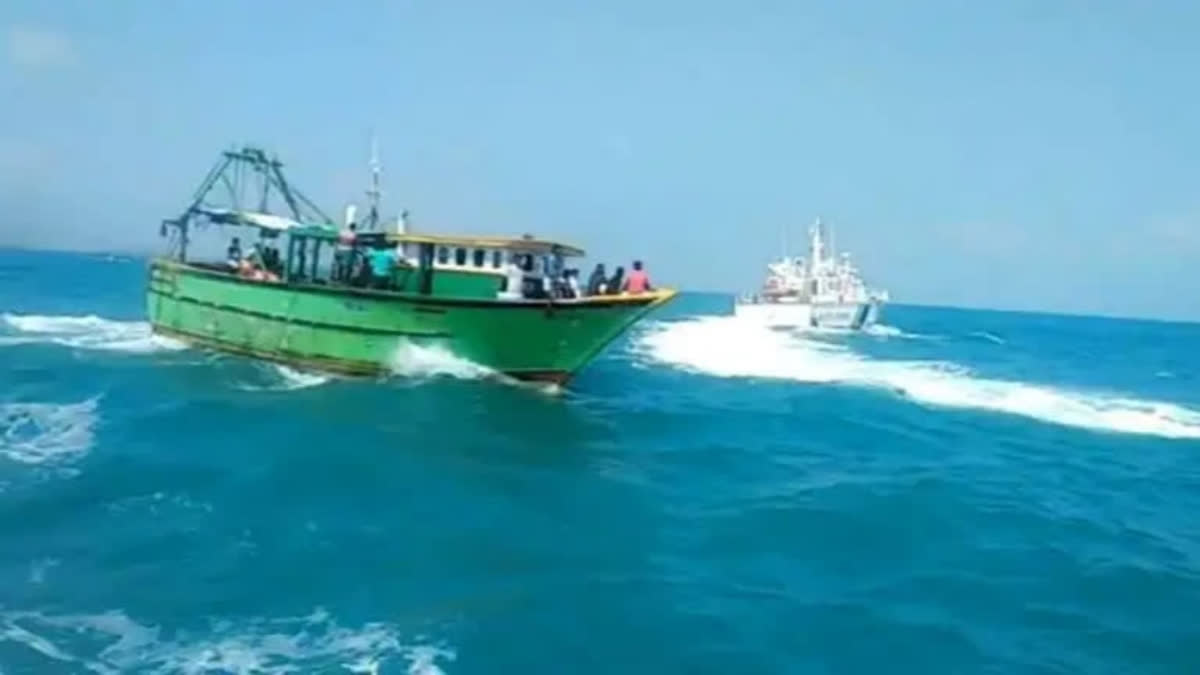Chennai: It has become habitual for Sri Lankan Navy to arrest Indian fishermen on charges of fishing in its "territorial" waters across the Palk Strait, resulting in a political hue and cry in Tamil Nadu.
Every time an arrest happens, Chief Minister MK Stalin writes to the Union Government to secure their release and find a permanent solution. This October itself, 64 fishers have been held and 10 of their boats seized. Prior to that, data shared by the Ministry of External Affairs shows that at least 74 Indian fishermen were arrested by Sri Lanka till June this year.
Not just arrests, a new problem of fishermen being attacked and their properties looted by “pirates” from Sri Lanka has cropped up. Asked about it, Sri Lankan Fisheries Minister Douglas Devananda, while speaking to ETV Bharat over the phone from Colombo, said his government has issued "stern warning" to the "pirates" and steps are being taken to ensure that such sporadic incidents do not recur.
On the Sri Lankan Navy arresting Indian fishermen from Tamil Nadu, Devananda said there was "political compulsion". "We are compelled to arrest. And there is the election as well," the Sri Lankan minister said.
The sea between the two nations – Palk Strait – is Indian fishermen's traditional fishing ground but Sri Lanka continues to take coercive steps including arrest and seizure of boats. However, Devananda said it was "wrong" to call the Sri Lankan territorial waters the traditional fishing ground of fishermen from the other side of the Strait.
"The 1976 amendment to the Katchatheevu Agreement of 1974, is very clear on this. When the fishermen from the Northern and Eastern Provinces complain to our government about the Indian fishermen entering into traditional fishing ground, we are compelled to act. Tamils on both sides of the Palk Strait share a common bond and are united umbilically. However, as the adage goes, “Even the mother and the offspring have their stomachs separate”. We can't remain oblivious to the problem concerning our fisher folks. Only the fish has no borders," he said.
The minister said the boats, nets and other equipment of the fishermen in the Northern and Eastern Provinces of the Island nation cannot match those of their brethren across the Palk Strait. "While the vessels of Indian fishermen are huge like a truck, those of our folks can be compared to autos. We are still crawling," he said.
Referring to Katchatheevu pact, the minister said Sri Lanka has lost a fertile fishing ground down Kanyakumari. Katchatheevu, a 163-acre uninhabited island administered by Sri Lanka, was a disputed territory between the two nations until 1974. That year, Prime Minister Indira Gandhi accepted Katchatheevu as Sri Lankan area under the "Indo-Sri Lankan Maritime agreement".
Devananda said while Sri Lanka was not keen on not aggravating the problem, the talks held in the past between fishermen representatives and officials of both countries have not yielded the desired results.
"During the talks held previously, the Indian side had asked us to be accommodative and lenient for two years so that alternative options could be ensured for the fishing community. But, till now alternative options for Tamil Nadu fishermen appear elusive. External Affairs Minister S Jaishankar knows the issue very well and where the problem lies. I have interacted with him since his stint in Sri Lanka as an official and later as well," the minister said.
Also read:



